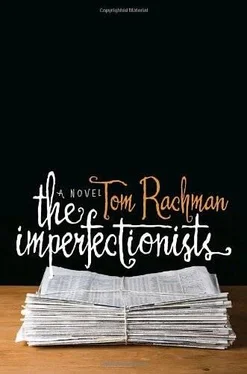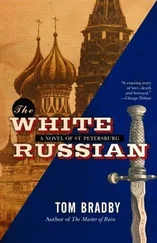She fills his glass. "I'd never have the courage to teach a class in anything. Not that I'm qualified to. Let alone in a foreign city. It's pretty brave."
"Or plain stupid."
"Brave," she insists.
He asks about her work. "Hate to admit it," he says, "but I've hardly read a newspaper in my life. So bloody small, isn't it."
"Small?"
"The writing. You need to make the writing bigger."
"Mm," she says. "Maybe."
"What do you write about then, Hardy?"
"Business." She sips her wine. "Sorry, I'm not keeping up with you here."
"You won't keep up with me," he replies good-naturedly.
"Can I pour you some more?" She does so. "Well, I was hired to write about personal finance and luxury goods. But I seem to have become a one-woman business section. We had this ancient guy in Paris called Lloyd Burko who used to do the occasional European business story. But now, essentially, it's just me."
"Nice one, Hardy." He notices something in her expression. "What's funny?"
"Nothing-I just like how you call me Hardy."
"That's your name, is it not?"
"Yes. But I mean how you say it."
"How's that?"
"Say it again."
"Hardy."
She smiles, then resumes: "Basically, financial reporting is this sinkhole at the center of journalism. You start by swimming around it until finally, reluctantly, you can't fight the pull anymore and you get sucked down the drain into the biz pages."
"That bad, is it?"
"Not really. I tend to dramatize. The sad truth is that I'm secretly into this stuff-I'm the kind of person who reads Morningstar stock reports on vacation. My feeling is that, at heart, every story is a business story."
"Ah, right," he says.
"But I'm weird that way."
He carries his dirty plate to the sink. She jumps to her feet. "No, no-you don't need to do that." She stumbles. "Oh-I think I'm a bit drunk."
In the restricted space of her kitchen, they are close. She looks up. "You're irritatingly tall. It's like an indictment of everything I stand for."
"You're not so short."
"Who said I was short? I'm a minimalist."
He leans down and kisses her. "Your nose is freezing, Hardy."
She touches it. She's no longer trying to sound clever. "Can you do that again?"
"What?"
"That thing you did before."
"Calling you Hardy?"
"No, the thing you did after that. The thing you just did."
"What thing?"
She kisses him. "That thing. Keep doing it, please."
Activities shift into the bedroom.
Afterward, they lie in the dark, side by side on her bed. "Can I get you anything?"
"No, no, Hardy. I'm lovely."
"I quite agree. A last bit of wine, maybe?"
"A wee dram wouldn't hurt."
She pours him a glassful and speeds back to the bedroom in bare feet. Before entering, she says, "I wasn't cold before, I was just nervous." She hands him the glass. "My nose, I mean."
He sips. "Delicious."
"You sound a bit drunk. Nice drunk, though. Charming drunk." She leans into him. "What's that tattoo, by the way?"
"It's a wolf. I got it done in Sydney. You like it?"
"A wolf? I thought it was a seal. A seal howling at the moon. Anyway, it's very nice." She kisses his shoulder. "It's so nice to have someone here."
The next day at the espresso bar, Annika asks for details. "Did your Irishman fix the window?"
"We got slightly drunk, actually."
"Oh really? Continue."
"No, nothing."
"No, something."
"Okay, something."
"And the window?"
Hardy hires a glazier-she doesn't want Rory to feel pressured about it each time he drops by. But a week later he hasn't dropped by again, hasn't called, hasn't answered her messages. She visits his place, ready for a sad scene. But when he opens the door he kisses her on the mouth and asks where on earth she's been. She ends up taking him home, feeding him, watering him, giving him lodgings, as before.
"I like coming here," he says, propped up in her bed as she dresses for work the next morning. "You have a proper bathtub."
"Is that the extent of my appeal? You're overlooking my shower."
"I prefer baths myself."
"You're not going to vanish again, are you?"
"What do you mean?"
"Vanish. As in absence of Rory. Deficit of Rory. Apartment devoid of Rory."
"Don't be batty. I'll give you a ring."
"When?"
"How's about tomorrow?"
"When you say tomorrow, do you mean two weeks from tomorrow?"
"I mean tomorrow. Actual tomorrow."
"As in two days after yesterday?"
He doesn't call. She wants to scream. But this is how he is: easygoing, which means tough-going for everyone else. She can hardly be surprised at this stage. She collects him from his hovel down the road in Trastevere as if he were a puppy, rescued from the pound for the umpteenth time, wagging at the sight of her yet certain to scamper away the minute she absents herself. His time without her, as far as she can tell, is occupied by reading books on the CIA and drinking plonk with his Italian hippie friends. His improv classes turn out to be more hypothetical than real. But everyone needs something they do, she decides, especially if they're not doing it.
What money he has comes from his father in infusions that arrive irregularly, so he is flush one week and broke the next. He spends it strangely: on a lime-green alarm clock, for example, although he has no reason to get up in the morning and no food in his apartment. When he's broke, she hides money in his jacket pocket. Now and then, she encourages him to start those improv classes, or seek employment of another kind-teaching English, perhaps. But his dream is to make it as a comedian and he's convinced that fame is around the corner, though how he might achieve this in Italy is beyond her. What's more, while he is a cheery fellow, he's not a markedly funny one. Hardy refuses to hear his stand-up routine. She's polite about this but firm.
One afternoon, Annika asks her, "What if I found Rory a one-off gig?"
"How would you do that?"
"You don't sound too enthusiastic."
"No, I am. Tell me."
Annika saw a flyer advertising a fund-raiser at a local pub for the Vatican Radio soccer team. The organizers already have a band arranged but are looking for other acts. "It wouldn't pay, but it'd be practice for him," Annika says. "And no pressure-just a bunch of friendly drunks."
"You're more intent on getting his career going than he is," Hardy says.
"I noticed."
Hardy and Rory meet up with Annika and Menzies at the pub. The crowd is large and boisterous, and a drum kit is set up on the stage at the back, with a microphone stand before it. They find a free table.
"This is marvelous, this is," Rory says and disappears to count the crowd.
Hardy grips Annika's leg under the table. "I'm so nervous."
"You're nervous?" Annika says. "You're not the one doing it."
"I know, but…"
Rory returns, beaming.
"You're excited, then?" Menzies asks him.
"Absolutely. Not a lot of opportunities in Italy to do stand-up in English."
"Almost none, I'd think."
"You're probably right."
"What sort of comedy do you do?"
"What do you mean?"
"Well, how would you describe your act?"
"You're gonna love it."
Hardy leans toward Rory and whispers, "Might be time to buy a round." She slips him a fifty-euro note under the table.
He taps Menzies on the shoulder. "I'm getting this one, folks. Same again, ladies?"
The emcee-an Englishman who normally delivers somber bulletins on Vatican Radio but is this evening dressed as a Harlequin-jogs across the stage. "Ready, everybody?"
"I think it's me now," Rory tells the table. He nods at Hardy and heads for the stage. The patrons part before him and strangers slap his back.
Annika tells Hardy, "Nothing to worry about-it'll be fun."
Читать дальше












